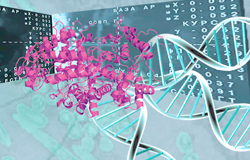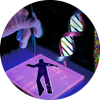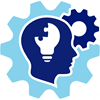About our Department
Our research
At ENCORE, we study the (rare) disorders our center focuses on. In this way we gain more knowledge of underlying causes, diagnosis and treatment, so that we can offer better treatments.
Patients may be invited to participate in clinical studies or pre-clinical research, for example by donating blood from which we can isolate cells for stem cell based research.
The research within ENCORE can be divided into three main areas:
- Pre-clinical (basic) research.
This (laboratory) research focuses mainly on mouse models and stem cells and is intended to gain more insight into the mechanism underlying the disorders. New insights should lead to developing new medicines that improve patients’ quality of life.
- Clinical (patient-related) research.
By conducting research with patients, we can learn more about the disorders. Examples are collecting clinical data to gain insight into the course of a disorder, comparing the most efficient epilepsy or sleep medication, and identifying the best communication technique.
- Translational research.
ENCORE wants to bridge the gap between basic laboratory research and the clinic. To this end, a great deal of translational research is being conducted. This can be laboratory research, such as research into the treatment of epilepsy in a mouse model of a disorder. Translational research can also be patient-related research, such as a clinical trial in which new drugs developed in the laboratory are tested on patients.
Conducting research is bound by strict (ethical) rules and is assessed by an ethics committee. This applies to both laboratory animal and patient-related research. For patient-related research, written permission from the parents / guardian is always required. Only if patients are willing to participate in research, the data will be used (anonymously) for research.
More information of the research performed on each of the (rare) disorders can be found on our ENCORE website.
Principal Investigators
The head of ENCORE Research is Prof. Dr. Ype Elgersma.
The research of the Elgersma lab mainly focusses' on Angelman Syndrome and Tuberous Sclerosis Complex, and the use of antisense oligonucleotide (ASO) therapy to treat neurodevelopmental disorders. For more information about the research in the Elgersma lab, please visit: Clinical genetics - research department - Erasmus MC
The lab Dr. Van Woerden lab focusses' in particular on CAMK2 related disorders. For more information see: Clinical genetics - research department - Erasmus MC
A list of all group leaders and ENCORE related research (clinical and preclinical research) can be found on our ENCORE website.
For functional genomics related studies pleased visit: www.functionalgenomics.nl.
Research Lines
We focus on genetic disorders that cause a disruption in normal (brain) development and therefore lead to intellectual disability, epilepsy and / or behavioral problems (e.g. autism). Clinical care is combined with basic and translational research into the causes and treatment. Because there are hundreds of different genes involved in brain development, we have defined two areas of interest:
1. Genes that not only affect brain development but are also associated with an increased risk of tumors (in the brain or elsewhere in the body). These are in particular genes that are part of the signaling pathway within the cell. Via this signal pathway, the (brain) cell translates the stimuli it receives into a signal that is sent to the nucleus where the DNA is stored. Activation of this signaling pathway leads to the transcription of DNA and to the production of new proteins that can have very diverse functions in the (brain) cell. Mutations in these genes therefore not only affect the development of the brain, but are usually also associated with an increased risk of tumors elsewhere in the body. This includes genes in the RAS-PI3K-MTOR signaling pathway as well as genes involved in the repair of the DNA:
- Brain Overgrowth Syndromes.
- Cortical malformation syndromes (MCD).
- Cardio-Facio-Cutaneous (CFC) Syndrome and Costello Syndrome (CS).
- DNA repair disorders.
- Neurofibromatosis type 1 (NF1).
- Sturge-Weber.
- Tuberous Sclerosis Complex (TSC).
2. Genes that have a direct effect on signaling between brain cells. Brain cells communicate with each other through contact points (synapses). These contact points between brain cells are constantly being adjusted and can decrease or increase in strength ("synaptic plasticity"). This synaptic plasticity is essential for learning and memory. Impaired synaptic plasticity usually also affects brain development. This causes intellectual disability, epilepsy and / or behavioral disorders (such as autism). We focus in particular on the following disorders:
- Angelman syndrome (AS).
- CAMK2 syndrome.
- Dup15q syndrome.
- Fragile X Syndrome (FXS).
- SYNGAP1 syndrome.
- Glutamate receptor syndromes (GRIN, GRIA).
- (Ultra) rare genetic disorders that lead to developmental disorders and autism ("Unique clinic").
Read more about the syndromes and the research on the syndrome specific pages on the ENCORE website.
Projects
Publications
An overview of health issues and development in a large clinical cohort of children with Angelman syndrome.
Heus, K.G.C.B.B., Mous, S.E., Hooven‐Radstaake, M., Iperen‐Kolk, B.M., Navis, C., Rietman, A.B., Hoopen, L.W., Brooks, A.S., AS, E.E.C. for, Elgersma, Y., et al. (2020). Am J Medical Genetics Part 182, 53–63.
Autism Symptoms in Children and Young Adults With Fragile X Syndrome, Angelman Syndrome, Tuberous Sclerosis Complex, and Neurofibromatosis Type 1: A Cross-Syndrome Comparison.
Lubbers, K., Stijl, E.M., Dierckx, B., Hagenaar, D.A., Hoopen, L.W. ten, Legerstee, J.S., Nijs, P.F.A. de, Rietman, A.B., Greaves-Lord, K., Hillegers, M.H.J., et al. (2022). Frontiers Psychiatry 13, 852208.
Identifying the temporal electrophysiological and molecular changes that contribute to TSC-associated epileptogenesis. Koene, L.M.C., Niggl, E., Wallaard, I., Proietti-Onori, M., Rotaru, D.C., and Elgersma, Y. (2021). Jci Insight 6, e150120.
Antisense oligonucleotide treatment rescues UBE3A expression and multiple phenotypes of an Angelman syndrome mouse model. Milazzo, C., Mientjes, E.J., Wallaard, I., Rasmussen, S.V., Erichsen, K.D., Kakunuri, T., Sman, A.S.E. van der, Kremer, T., Miller, M.T., Hoener, M.C., et al. (2021). Jci Insight 6, e145991.
Loss of nuclear UBE3A causes electrophysiological and behavioral deficits in mice and is associated with Angelman syndrome. Avagliano-Trezza, R., Sonzogni, M., Bossuyt, S.N.V., Zampeta, F.I., Punt, A.M., Berg, M. van den, Rotaru, D.C., Koene, L.M.C., Munshi, S.T., Stedehouder, J., et al. (2019). Nat Neurosci 22, 1235–1247.


